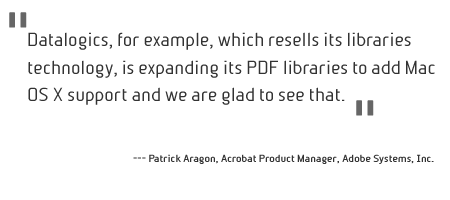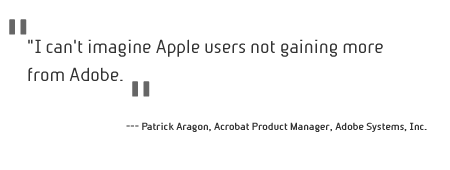|
page:
| 1 | 2 | 3 |
Adobe
and Apple
When
Apple introduced the ability to easily produce PDF documents
from within its OS X operating system, some in the industry
immediately reacted by assuming the company was stepping
on Adobe's toes and by-passing the need for Acrobat products.
But that was actually not the case at all. As already
mentioned, Adobe publishes everything a developer would
need to create tools that produce native PDF document
files.

Patrick
Aragon said Adobe sees Apple's adoption of PDF as a good
thing and says that more third-party
companies are helping to expand support for OS X. "Datalogics,
for example," says Aragon, "which resells its libraries
technology, is expanding its PDF libraries to add Mac
OS X support and we are glad to see that."
When
Apple announced their transition to Intel chips Adobe
was there to voice their support for the move. At the
time of this interview, shortly before Macworld Expo,
I asked Aragon about Adobe's plans for native Universal
binaries
for Acrobat on Intel-based Macs and he said that at the
time the company didn't know when those machines were
coming out. In many regards this spoke volumes about
the level of secrecy Jobs maintained on the Intel-based
Macs announced at Macworld. Adobe is usually one of the
rare few who get to know what is happening before anybody
else does.

Of
course nobody should take that as a sign of Apple-Adobe
relations. Aragon said several times during the interview
that Apple is absolutely an important partner to Adobe.
When I asked Patrick Aragon if Apple customers might
gain more now, from Adobe, since Apple is adopting Intel
chips he said, "I can't imagine Apple users not gaining
more from Adobe."
page:
| 1 | 2 | 3 |
Analysis
and Commentary
In
regard to Adobe's recognition of the value in having
cross-platform support in Acrobat PDF technologies: As
analysts continue to point out, Apple's Mac OS X system
is expected
to
gain small but significant market share over
the next few years, due in no small measure to the iPod's
popularity.
Likewise, governments and large institutions
and companies around the globe already have or are planning
to institute
wide-spread desktop deployments of Linux in
lieu of Microsoft's ubiquitous Windows. Moreover, new
Web browsers
like Firefox
and Apple's Safari have made significant market
share gains cutting into Microsoft's Explorer web browser.
A
careful analysis of these trends -- both Apple's OS
X market share gains and potentials, and the same for
Linux -- reveals that even a cautious approach to the
market by Autodesk would have them beginning to develop
more cross-platform technology, rather than retreat
in the other (Windows-only) direction. We suspect however,
that Autodesk management is going to find this decision
a tough internal 'tug-of-war'. One camp will say, why
not be prudent and cover our bases, while enjoining
to
that argument the experience of cross-platform development
from Alias. The other camp will resist stating its
position is stronger by continuing to muscle up with
key partner
Microsoft.
In
looking at this situation we see Autodesk's position
with DWF similar to Apple's position with FairPlay, iTunes
and the iPod. Both are taking a semi-proprietary/semi-open
approach but one is doing it in the consumer space while
the other is in an industry with entrenched multiple-interests
and stakeholders. The virtue of open-standards in the
consumer space is not the same as in a professional industry.
It's time the industry recognize the subtle and multifaceted
differences between models. To simple say it's "open
versus closed" is vastly over simplifying the case.
Looking
out then we see Autodesk being pushed into cross-platform
support because ultimately both Linux and OS X, but Linux
in particular, will shape collaboration in the enterprise
market.
page:
| 1 | 2 | 3 |
|






![]()
![]()